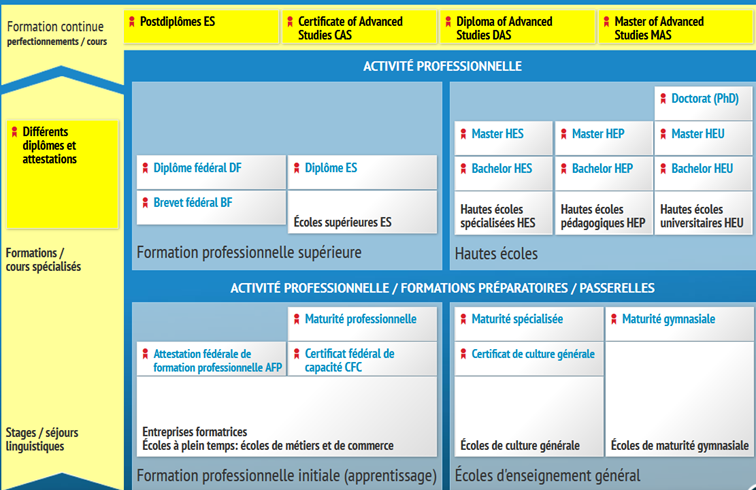The Executive Education offers a wide range of continuing education courses leading to a CAS and/or DAS. But it's hard to tell the difference between these diplomas with their rather barbaric names 😉 ! We explain the differences between a CAS, MAS and DAS in terms of characteristics, advantages and career opportunities. Let's go!
Brevet, federal diploma, CAS, MAS or DAS: what's the difference?
As you can see from the diagram below, there are several different training paths, each with its own Swiss diploma.
Would you like to understand more about these two training systems? Take a look at this interactive diagram of the Swiss education & training system.

You may find it difficult to sort out the different types of diploma recognized in Switzerland. Here's some quick information to help you make sense of it all:
- The Brevet Fédéral and Diplôme Fédéral are federal exams that allow you to specialize in a particular profession. To obtain this diploma, you must first hold a Certificat Fédéral de Capacité and have worked for a company for several years.MAS, CAS and DAS are continuing education qualifications awarded by universities and enable you to obtain a university degree.
Find out more in our comprehensive guide to continuing education qualifications in Switzerland.
Focus: what are ECTS credits for?
CAS, MAS and DAS degrees are part of continuing education and are recognized by universities that have signed up to the Bologna system. This European standard makes it possible to award (and accumulate!) ECTS credits, facilitating recognition from one country to another.
These ECTS credits are awarded when the participant satisfies the conditions for validation of the course. Here's how they work universally:
- 1 ECTS credit = between 25 and 30 hours of work
- 60 ECTS credits = one year of study, around 1800 hours of training
For information, a minimum of 10 ECTS credits is required to obtain a CAS.
Differences between CAS, DAS, MAS
CAS characteristics
The Certificate of Advanced Studies (CAS) is awarded on completion of at least 120 hours of training (sometimes including a final report). It corresponds to a minimum of 10 ECTS credits. In some fields, a combination of several CAS courses leads to a DAS.
Here are the CAS available at HEC Lausanne:
- Project leadership
- Team management
- Change management
- Digital marketing
- Strategic marketing
- Data science & management
- Finance & accounting
DAS characteristics
The Diploma of Advanced Studies (DAS) is a diploma awarded on completion of an on-the-job training program. This diploma is awarded after at least 250 hours of training, and will be subject to a knowledge assessment. It entitles you to a minimum of 30 ECTS credits.
Here are the DAS programs available at HEC Lausanne:
- Management & leadership
- Strategic & digital marketing
MAS characteristics
The Master of Advanced Studies or MAS offers 60 ECTS credits. This diploma is awarded after a minimum of one year's training, including the writing of a final report. To be eligible for MAS, you must have a university degree and professional experience.
Beware of confusion: an MAS is not a Master's degree as it is called in other universities.
GOOD TO KNOW
At HEC Lausanne, we don't offer an MAS, but there is an eMBA (Executive Master of Business Administration) with two specializations:
- Focus on Healthcare Management
- Focus on Financial Management
Comparable to a MAS, the eMBA is particularly aimed at senior executives and/or people with several years' professional experience, who have obtained a university degree. Find out more about the program and how to apply.
CAS, MAS and DAS: progressive university programs
What are the main advantages?
- Thanks to ECTS credits, you can continue your training even if you take a break from your studies. As these courses are open-ended, you can go from a CAS to a DAS to an MAS. It is also possible to obtain an eMBA.
- CAS, MAS and DAS degrees are university qualifications recognized in most countries. A real asset if you want to work abroad!
Still not sure what's the best way to perfect your skills? Are you torn between a CAS and a Diplôme Fédéral? These two training systems don't cater for the same profiles: find out how to choose between professional and continuing training in Switzerland!




